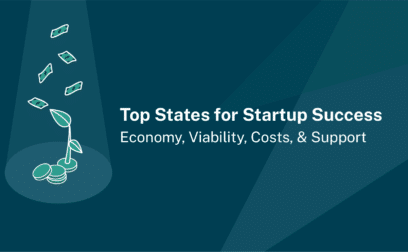TABLE OF CONTENTS
Loans
Equity
Grants









Page written by Chris Godfrey. Last reviewed on June 2, 2025. Next review due October 1, 2026.

Women farmers play a key role in US agriculture, owning or operating more than half the nation’s farms. However, getting business funding has traditionally been tougher for female famers than for their male counterparts. Fortunately, this situation is changing, as specialized business loans and grants available to women farmers are now levelling the farming field.
Farm loans are specialized financial products designed to support farmers and agricultural organizations across the US. These loans cater to the unique needs of the agricultural industry, allowing farmers to finance a wide range of business expenses. Use farm loans to purchase agricultural land, property, livestock, equipment, vehicles, seeds, feed, and cover many operational costs. Borrow up to $5million
Farm loans can provide crucial financial support for female farmers who are looking to establish or improve their farming or ranching operations.
A farm loan can enhance cash flow and liquidity, making it easier to cover day-to-day operational expenses, such as purchasing supplies or paying employees. By smoothing cash flow, female farmers can better manage their financial resources and reduce the impact of seasonal fluctuations
Farm loans give female farmers the ability to purchase goods in larger volumes. Bulk purchases are often more cost-effective, allowing farmers to buy feed, seeds, equipment, or other necessities at lower prices and improve overall profitability.
By obtaining a loan or grant, women farmers can plan for the future more effectively. With a steady cash flow, they can eliminate the extreme highs and lows often associated with agricultural income and better predict and manage their financial needs.
Farm loans allow women to finance capital investments, such as equipment or land, over an extended period. Rather than paying for expensive items all at once, loans enable farmers to spread the cost, making large purchases more manageable and reducing strain on working capital.
Having access to borrowed or donated capital means female farmers can purchase what they need when they need it, rather than waiting until their working capital permits. This helps avoid delays in operations and allows farmers to take advantage of good market conditions when they arise.
With improved access to funds, women farmers can seize profitable business opportunities as they emerge. Whether it’s buying new livestock or expanding land holdings, having ready access to capital can make all the difference when pursuing growth opportunities.
Agriculture is inherently risky, with unexpected costs often arising due to equipment failures, extreme weather events, or other emergencies. A farm loan can help female farmers manage these unforeseen expenses without causing significant disruption to their business operations.
Many types of farm loan are available to female farmers:
SBA Loans
US Small Business Administration (SBA) loans are available to female farmers, though they’re not exclusively for women. SBA loans are partially backed by the US government, which means they typically come with lower interest rates and fees than traditional commercial loans.
SBA loans suitable for women farmers: (Collateral or a personal guarantee may be required).
The US Farm Service Agency (FSA) offers various loan programs to support farmers and ranchers. These loans are offered either directly from the FSA or through their network of commercial and nonprofit lenders. FSA loans may be particularly beneficial for women farmers, beginning farmers, and historically underserved groups.
FSA loans fall into three main categories:
Term loans are the most popular type of commercial farm loan. Offered by traditional banks, credit unions and online lenders, these loans are typically used for one-off investments where farmers know exactly how much cash they need. You receive a single, lump-sum cash injection and then pay it back in regular instalments over a fixed period of up to 25 years. Collateral may be required.
Also known as a revolving line of credit, this is a farm loan that functions like a high-value credit card but comes with lower interest rates and fees. Women farmers can withdraw as much as they want when they want from a loan facility up to the limit of their borrowing. Collateral may be required.
Business credit cards can be useful to cover small farm expenses, although they may require collateral or a personal guarantee. Note that higher fees and interest rates may apply if you don’t pay back the total balance every month.
Also known as account receivables financing, this type of loan allows famers to borrow against the value of their unpaid invoices. Instead of waiting 30, 60, 90 days or more to get paid, lenders may provide up to 95% of the invoice value within a few days or even hours of the bill being raised. No added collateral required.
With equipment financing, you use the asset you’re purchasing (such as farm machinery or vehicles) as collateral for the loan. This type of borrowing is ideal for farms with erratic cash flow or low working capital. Use the asset as you pay for it. Spread the cost over time.
Eligibility criteria for farm loans varies by lender. However, common factors that influence qualification include:
Farm loan applications can require extensive documentation, which may include:
Interest rates for farm loans for women can be as low as 5% per year, but the rate you pay will depend on the type of loan you select, the policies of your lender, and your business circumstances.
The interest rate, fees, and terms and conditions of farm loans can vary significantly. Shopping around before settling on a deal is therefore essential. You can do this by approaching banks, credit unions and online lenders one by one over days, weeks, or even months, or you can use the services of a loan marketplace that can quickly introduce you to a choice of farm financing from a range of lenders. Some marketplace platforms can also give you advice and help you with the application process.
In addition to loans, women farmers may be eligible for various farming grants. Although grants will usually provide less cash than commercial loans and are typically more difficult to obtain, they have a key advantage: They’re effectively free money. You don’t have to repay the funds if you observe the rules.
Grants for female farmers include:
Offered through the University of Vermont Extension, the Vermont Farm Women’s Fund provides scholarships that awardees can use to cover the costs of registering for and attending educational conferences, courses and other classes. Scholarships are capped at $150, and the fund focuses on helping women who own, operate and/or work on farms in Vermont.
Operated and managed by the USDA, this program, also known as the Women and Minorities in Science, Technology, Engineering and Mathematics Fields Program, offer grants up to $300,000 to support research into a range of agricultural projects
The Sustainable Agriculture Research and Education (SARE) Grant Program provides competitive grants for sustainable agriculture research and education projects. Supported by the National Institute of Food and Agriculture, SARE grants are available to US-based farmers, ranchers, researchers, graduate students, extension agents and other educators. Eligible projects include on-farm renewable energy, pest and weed management, no-till and conservation tillage, pollinators and small ruminants. SARE is divided into four geographical regions—North Central, Northeast, South and West—each has its own set of grant opportunities. Funding up to $250,000 may be available.
The FruitGuys Community Fund (TFGCF) provides grants to US-based small farms and agricultural nonprofits. Grants are available up to $5,000 and funds can be used to improve operations. To qualify you must also be an agricultural nonprofit or the owner or operator of a farm or otherwise have legal access to the land where it is located. The farm must have been a small to medium-sized working farm for at least one year before applying.
The National Young Farmers Coalition offers the Young Farmer Grant Program. The program offers 75 grants, each worth $5,000, plus membership to the National Young Farmers Coalition. Recipients can use funds to cover the costs of starting, running and growing farm operations, with no additional limitations. The organization provides at least 50% of the grants to Black, Indigenous and other people of color and 50% to female-identifying, non-binary and trans farmers—though the organization points out that these categories are not mutually exclusive.
The Food Animal Concerns Trust (FACT) provides Fund-a-Farmer Grants, which are aimed at improving farm animal welfare and supporting the expansion of humane farming practices. Grants may be secured up to $3,000 in value, with funds used for capital and operation work related to supporting the organization’s goals. Projects may include things like fencing, watering systems, access to share, cattle scratching stations and mobile animal shelters.
The American Agri-Women Foundation (AAW) provides a limited number of scholarships to young people and AAW members up to a maximum of $1,000 per applicant.
You can improve your chances of getting approved for a farm loan by preparing in advance. Key tasks to take care of include:
Why do you need the money? What do you expect the finance to achieve for your business? You must present a strong case to secure a farm loan and your financial records must support your need, indicating how the loan will deliver your plan – and critically, how you will pay the loan back.
Qualifying rules for farm loans can vary significantly. Beyond the standard time in business, revenues and credit check guidelines, some lenders, such as the SBA and the FSA will have their own specific hurdles that you must overcome. (For example, to secure an SBA farm loan, your business must be US based and you cannot be delinquent on any other government debt – including taxes). Make sure you meet the eligibility rules for the lender you are applying to. If you have holes in your request, such as errors on your credit report, take steps to fix them before submitting your application.
Some loans work better for some farming needs than others. Also, should you go for a loan or a grant? Which loans are cheapest? Which are the fastest to secure? Research all the funding types you may qualify for before settling on your final option.
Once you’re ready to make an application, check out offers from lenders and grant providers. You can do this by approaching banks, credit unions, nonprofits and online lenders one by one, or you can use the services of a loan marketplace that will introduce you to a choice of loan deals from different funders. Some marketplace platforms can also give you advice and help you with the application process. This can be especially useful for farm owners who have never taken out a loan or grant before.
Make sure you are within the deadline stipulated by the lender or grant provider before submitting your application and ensure you have provided all the necessary documents and information they require. Keep in mind that processing times can vary enormously, with some providers taking many weeks to arrive at a final decision and disburse their funds.
If you need funds in a hurry, you may be eligible for a fast farm loan. Start that process here.
Working with business finance experts can make all the difference when applying for your farm loan. Contact Swoop to discuss your borrowing needs, get help with your application and to compare high-quality farm loans for women from a choice of lenders. Help your farming business grow. Register with Swoop today.
Chris is a freelance copywriter and content creator. He has been active in the marketing, advertising, and publishing industries for more than twenty-five years. Writing for Wells Fargo Bank, Visa, Experian, Ebay, Flywire, insurers and pension funds, his words have appeared online and in print to inform, entertain and explain the complex world of US consumer and business finance.
Swoop promise
At Swoop we want to make it easy for SMEs to understand the sometimes overwhelming world of business finance and insurance. Our goal is simple – to distill complex topics, unravel jargon, offer transparent and impartial information, and empower businesses to make smart financial decisions with confidence.
Find out more about Swoop’s editorial principles by reading our editorial policy.
Related pages
Get your free Farm loans for women quote today
Join the 95,000+ businesses just like yours getting the Swoop newsletter.
Free. No spam. Opt out whenever you like.
Kingfisher Way, Silverlink Business Park, Newcastle upon Tyne, NE28 9NX, UK
View in Google Maps35 Bull Street, Lewis Building, Birmingham B4 6AF, UK
View in Google MapsAberystwyth Innovation and Enterprise Campus
Gogerddan Campus
Aberystwyth University
Ceredigion
SY23 3EE
Dogpatch Labs, The CHQ Building, Custom House Quay, Dublin, Ireland
View in Google MapsSuite 801, Level 8, 84 Pitt Street, Sydney, NSW 2000, Australia
View in Google Maps43 W 23rd St, New York, NY 10010, United States
View in Google Maps21 Dreyer Street, Cape Town, South Africa, 7708
View in Google MapsClever finance tips and the latest news
Delivered to your inbox monthly
Join the 95,000+ businesses just like yours getting the Swoop newsletter. Free. No spam. Opt out whenever you like.




